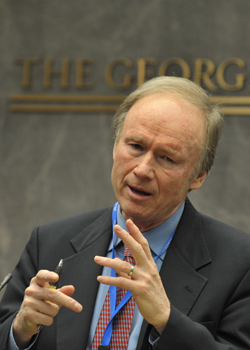All information taken from AALS 2013 Annual Meeting Final Program.
Four Chicago-Kent faculty members presented at the 2013 Annual Meeting of the Association of American Law Schools, Global Engagement and the Legal Academy, held January 4-7 in New Orleans. Below are the list of faculty members and the descriptions of the panels in which they participated.
César Rosado Marzán – Participated in “Workers After the Ascendancy of Global Financial Capital,” a Joint Program of Sections on Comparative Law and Labor Relations and Employment Law. Professor Rosado Marzán was featured in the program’s second panel:
“The second panel will bring a comparative perspective to the evolutions of labor and employment law following the rise of financial capital and the financial crisis. How have different legal orders facilitated and/or responded to the rise of ‘precarious’ or ‘contingent’ work, the decline of the standard employment contracts, and the burdens of the crisis on the most vulnerable workers, such as migrant workers? How might we evaluate the broader developments in law and public policy in fields such as corporate governance, as they affect the status of workers? How does comparison across national and supranational legal orders illuminate the varieties of capitalism? How has the global financial crisis affected workers in China and the developing world?”
The papers from this program’s panels will be published in the Employee Rights & Employment Policy Journal.
Sarah Harding – Participated in “Reconsidering the Institutional Role and Purpose of the Research Dean (‘Who Are We, and Why Are We Here?’),” an AALS Roundtable for Research Deans:
“Twenty years ago, most U.S. law schools did not feature a person appointed as ‘Associate Dean for Faculty Research,’ yet today, such positions are quite commonplace. Although the nomenclature of the position varies from place to place, the role and duties generally encompass helping colleagues—and particularly junior colleagues—develop and execute their scholarly agendas. To date, however, the precise nature and scope of a research dean’s duties have not received much, if any, sustained attention. Given the ubiquity of this new position, the time has come to ask—and attempt to answer—the ‘Admiral Stockdale’ question, namely ‘who are we, and why are we here?’ Precisely what is the institutional role and purpose of having a research dean? What sorts of expectations are reasonable and achievable? What pitfalls exist? What kind of institutional support should someone considering appointment to such a post seek from her dean? Do conflicting duties exist, e.g., as a mentor versus an evaluator in the promotion and tenure process? If so, how should one attempt to navigate them? The panelists for this presentation are all current research deans or have recently served in this capacity; they also have done so at various stages of their academic careers. In a roundtable format, these current and recovering research deans will address these and other pertinent issues related to this new administrative position.”
Christopher Schmidt – Participated in a Section on Legal History panel titled “New Directions in Southern Legal History”:
“This panel will examine innovative and original research being done into the legal history of the American South. Drawing on their current work and also insights from a forthcoming edited collection, Signposts: New Directions in Southern Legal History (University of Georgia Press), this panel asks new questions and considers new approaches to issues that have long dominated the field, including the role of the law in maintaining and then eradicating slavery, in providing for racial equality, voting rights, property rights and the role of law in the creation and maintenance of a Southern culture. The panelists bring renewed attention to the role of Southern moderates in ongoing legal battles, to alternative conceptions of legal pluralism, and to a greater understanding of Southern history from the ‘bottom-up’ as well as new analysis of the legal reasoning at work in cases like Bakke and San Antonio v. Rodriguez. A broad sweep of history will be considered, and the panelists will discuss work that ranges from the 17th century to the late 20th century.”
Lori Andrews – Participated in a Section on Intellectual Property panel titled “Intellectual Property and Social Media”:
“Social media, such as Facebook, Twitter, Pinterest, and 23andMe, have changed the ways we communicate, create, innovate, and advertise. As the components of creation and branding become more social, collaborative, instantaneous, and atomistic, various legal doctrines that have long governed copyright, patent, and trademark law may need to be rethought. Social media are being used to further genetic research, change how content is made, and draw users into the innovative process. This panel considers the challenges raised by social media to traditional intellectual property law, and explores the doctrinal implications of those challenges.”
In addition to the Chicago-Kent speakers, papers from a Section on Commercial and Related Consumer Law panel titled “Aberrant Contracts: Fringe Economy Lending and Other Atypical Consumer Agreements” will be published in the Chicago-Kent Law Review.



Leave a Reply